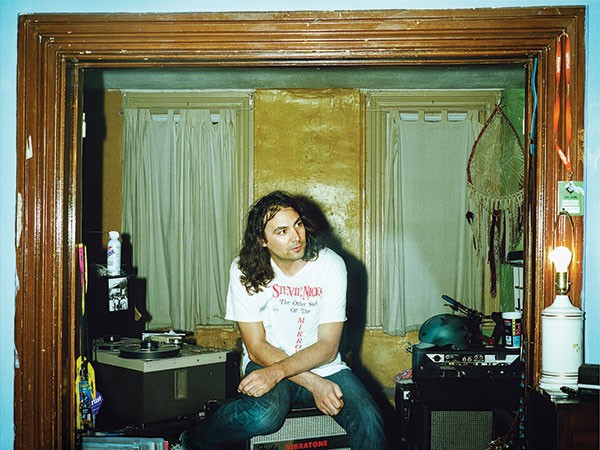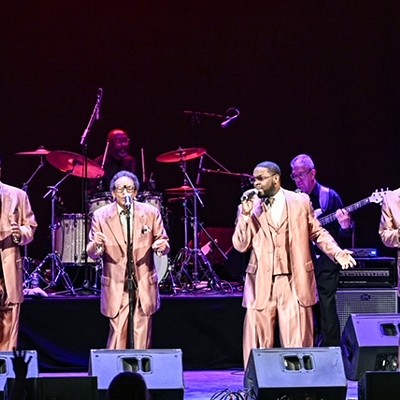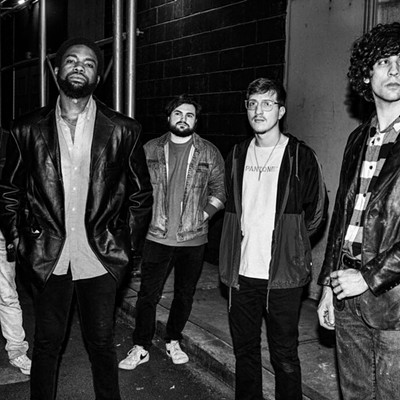For Adam Granduciel, mastermind of Philadelphia rock outfit The War on Drugs, the challenge in compiling material for his third album was convincing himself that the quality of his output matched the loftiness of his intentions. With two critically acclaimed albums (2008's Wagonwheel Blues and 2011's Slave Ambient) under his belt, and a fervent fan base, each subsequent War on Drugs album is released to higher expectations and increased scrutiny.
"What I struggled most with this time around was just letting it happen and not overthinking everything," Granduciel says. "Getting there was just a journey ... I wanted to make something as good as I could for the fans, and for the canon of contemporary music. I also was constantly second-guessing whether the decisions I was making were bad decisions."
Given the stakes, his concern is legitimate. Lost in the Dream was brought to light under different conditions than his debut and sophomore efforts. Finding the courage to change a successful formula can be intimidating. While it took multiple years to compile material for both Wagonwheel Blues and Slave Ambient, Lost in the Dream's gestation period was markedly shorter, coming together in just over a year. For all his self-doubt, Granduciel's third effort under the War on Drugs flag stands as proof that the experience he acquired in the past decade has given him greater control, if not mastery, of his creative process. Tightening his timeline has had the effect of bringing Granduciel's vision into tighter focus.
Lost in the Dream stands with the best of the War on Drugs discography, taking the characteristically urgent and expansive sound and adding lyrical elements that offer greater insight into Granduciel's worldview. Where previous releases featured stream-of-consciousness snippets of poetry, here his ideas are more fully formed. While they may not amount to a specific narrative, they speak to the process of coming to terms with the intractable and the unknowable. Recent interviews with Granduciel allude to struggles with depression, as well as coping with loneliness after returning from a long time out on the road with his band. "You were raised on a promise / But found that over time / You better come around to the new way / Or watch as it all breaks down," he sings on album opener "Under the Pressure."
Given the free-wheeling expansiveness, the out-to-the-edges fullness, of the War on Drugs sound, it is hard to imagine the songs arriving into the world anything other than fully formed. This sense of immediacy is actually the result of careful deliberation, scrutiny and patience. It may ruin a little bit of the band's magic to learn, but The War on Drugs' characteristic fullness is pieced together like all art is pieced together: bit by grueling bit.
"All the songs on the record were built upon ideas that started at home. I have a home studio, which isn't very extravagant, but I have a tape machine and I have a console," Granduciel says. He is content to let the songs take shape of their own volition and at their own pace. "All the songs on the record are built with that kind of idea: just me having an idea and working on a song for maybe a few weeks, sometimes, or maybe just at night."
When he's satisfied with the frameworks he's constructed, after the joists, the beams, and the rafters have been tested and proven sufficiently sturdy, he brings them to the band for embellishment. "I spent most of 2013 putting the band on it. It was kind of like going into the studio with this stuff already presented in bare-bones form and just building it up," Granduciel says, "To me, that's the most exciting time. ... You give yourself a grid and you can kind of go in and shape it, throw paint around."
Ultimately, Granduciel still reserves his right to have the final say over his bandmates' contributions. "I think that I have ideas for certain songs to where I can play to their strengths best," he says. "At least for now, the best I can do as a bandleader is let people know that i think they're perfect for something. ... I love playing keyboards and synth. It's not that I don't want to give up control; I just love doing that stuff. I don't want to, all of a sudden, just be a songwriter."
For all of the talk of the band's timelessness — for all the allusions made to Springsteen, Petty, Dylan and the War on Drugs' lush sound, which seems to be the product of a bygone era — Granduciel remains pragmatic in his approach, using every tool at his disposal, timeless and otherwise, to craft the perfect sound. At a certain stage in the process, "I transfer all the tapes into ProTools, which is cool," he says. "I can record in my house in this weird little analog world, and get a really subtle beauty going, but then I can also just say, ‘Let's just do one more bridge.' You're moving structure; you're not just copying and pasting."
Granduciel's consistent delivery is the result of faith in his instinct and in the methodology of his creative process. Granduciel cites that interim period — the time spent between framing the songs, then revisiting them — as the most crucial part of the whole process. He likens it to photography. "Sometimes I don't know what I'm going to end up with. One of my favorite parts of taking pictures is when you drop it off at the photo lab and wait to get it back. [It's] that moment where you look through the package for the first time to see how the shit ended up."














